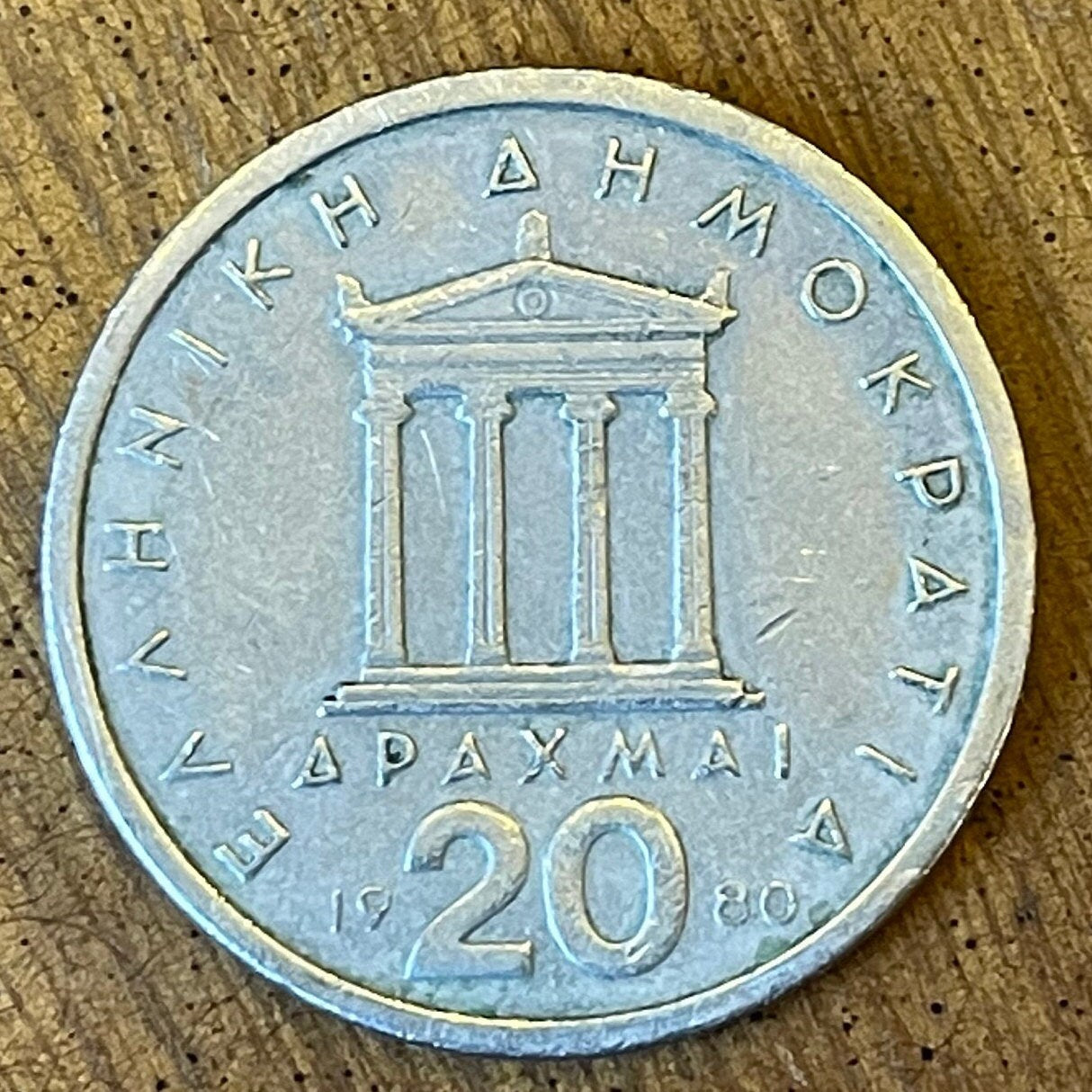elemintalshop
Parthenon & Pericles 20 Drachmai Greece Authentic Coin Money for Jewelry and Craft Making (Temple of Athena)
Parthenon & Pericles 20 Drachmai Greece Authentic Coin Money for Jewelry and Craft Making (Temple of Athena)
Couldn't load pickup availability
Parthenon & Pericles 20 Drachmai Greece Authentic Coin Charm for Jewelry and Craft Making (Temple of Athena)
Obverse: The portrait of Pericles (ca. 495 – 429 BC), a prominent and influential statesman, orator, and general of Athens in the city's Golden Age, facing left surrounded with his name in Greek (ΠΕΡΙΚΛΗΣ)
Lettering: ΠΕΡΙΚΛΗΣ
Translation: Pericles
Reverse: The Parthenon surrounded with the value and the country name
Lettering:
ΕΛΛΗΝΙΚΗ ΔΗΜΟΚΡΑΤΙΑ
ΔΡΑΧΜΑΙ
20
Translation:
Republic of Greece
Drachmai
20
Features
Issuer Greece
Period Third Hellenic Republic (1974-date)
Type Standard circulation coin
Years 1982-1988
Value 20 Drachmes (20 GRD)
Currency Third modern drachma (1954-2001)
Composition Copper-nickel
Weight 11.15 g
Diameter 28.8 mm
Thickness 2.25 mm
Shape Round
Technique Milled
Orientation Medal alignment ↑↑
Demonetized 28 February 2002
Number N# 564
References KM# 133, Schön# 86
Wikipedia:
The Parthenon (/ˈpɑːrθəˌnɒn, -nən/; Ancient Greek: Παρθενών; Greek: Παρθενώνας, Parthenónas, [parθeˈnonas]) is a former temple on the Athenian Acropolis, Greece, dedicated to the goddess Athena, whom the people of Athens considered their patron. Construction began in 447 BC when the Athenian Empire was at the peak of its power. It was completed in 438 BC, although decoration of the building continued until 432 BC. It is the most important surviving building of Classical Greece, generally considered the zenith of the Doric order. Its decorative sculptures are considered some of the high points of Greek art. The Parthenon is regarded as an enduring symbol of Ancient Greece, Democracy and Western civilization, and one of the world's greatest cultural monuments. To the Athenians who built it, the Parthenon, and other Periclean monuments of the Acropolis, were seen fundamentally as a celebration of Hellenic victory over the Persian invaders and as a thanksgiving to the gods for that victory.
The Parthenon itself replaced an older temple of Athena, which historians call the Pre-Parthenon or Older Parthenon, that was destroyed in the Persian invasion of 480 BC. Like most Greek temples, the Parthenon served a practical purpose as the city treasury. For a time, it served as the treasury of the Delian League, which later became the Athenian Empire. In the final decade of the 6th century AD, the Parthenon was converted into a Christian church dedicated to the Virgin Mary.
After the Ottoman conquest, it was turned into a mosque in the early 1460s. On 26 September 1687, an Ottoman ammunition dump inside the building was ignited by Venetian bombardment during a siege of the Acropolis. The resulting explosion severely damaged the Parthenon and its sculptures. From 1800 to 1803, Thomas Bruce, 7th Earl of Elgin removed some of the surviving sculptures, now known as the Elgin Marbles, with the alleged permission of the Turks of the Ottoman Empire.
*********
Wikipedia:
Pericles (/ˈpɛrɪkliːz/; Attic Greek: Περικλῆς, pronounced [pe.ri.klɛ̂ːs] in Classical Attic; c. 495 – 429 BC) was a Greek statesman and general of Athens during its golden age. Pericles was prominent and influential in Athenian politics, particularly between the Persian and the Peloponnesian Wars, and was acclaimed by Thucydides, a contemporary historian, as "the first citizen of Athens". He turned the Delian League into an Athenian empire and led his countrymen during the first two years of the Peloponnesian War. The period during which he led Athens, roughly from 461 to 429 BC, is sometimes known as the "Age of Pericles", but the period thus denoted can include times as early as the Persian Wars or as late as the following century.
Pericles promoted the arts and literature, and it is principally through his efforts that Athens acquired the reputation of being the educational and cultural center of the ancient Greek world. He started an ambitious project that generated most of the surviving structures on the Acropolis, including the Parthenon. This project beautified and protected the city, exhibited its glory and gave work to its people. Pericles also fostered Athenian democracy to such an extent that critics call him a populist. Pericles was descended, through his mother, from the powerful and historically-influential Alcmaeonid family. He, along with several members of his family, succumbed to the Plague of Athens in 429 BC, which weakened the city-state during a protracted conflict with Sparta.
******
Share










The coins were shipped promptly and each one was placed in a protective sleeve. Absolutely beautiful pieces.
Great coins received on time
Great stuff thank you so much.
Love my new keepsake coin! Arrived quickly and safely
Just as described! Thank you.









